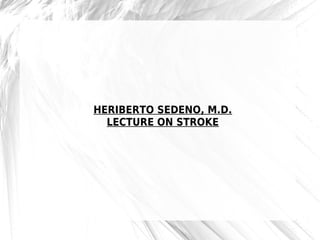
Dr. Heriberto Sedeno Lecture on Stroke: Types and Causes
- 1. HERIBERTO SEDENO, M.D. LECTURE ON STROKE
- 2. What is a Stroke? A stroke—also called a cerebrovascular accident or "brain attack"—is a medical emergency where part of the brain is deprived of oxygen. This occurs when an artery that supplies oxygenated blood to the brain becomes damaged in one of several ways. Within minutes of being deprived of oxygen, brain cells begin to die. The longer the brain goes without oxygenated blood, the greater the chances of permanent damage. The death of brain cells allows for the accumulation of toxic chemicals that blood, when flowing properly, usually removes from the brain. Without proper treatment, the accumulation can affect nearby cells. Potential damage from a stroke includes paralysis, impaired speech, memory loss, coma, or death.
- 3. Prompt treatment improves the chances for survival and decreases the risk of brain damage. Approximately 795,000 Americans suffer a stroke each year. Of those who have a stroke, about 150,000 die each year, making it the third leading cause of death in the country. About 75 percent of stroke victims are over the age of 65. Worldwide, there are 15 million strokes a year. Of those, a third die and another third are permanently disabled. Despite these daunting statistics, thanks to education, prevention, and medical advances, fewer people are dying from strokes every year.
- 4. Types of Strokes A stroke is categorized by the nature of the blockage and where it originates. Two main categories of strokes are ischemic and hemorrhagic. Ischemic Strokes Clots form in arteries and block blood flow in a process called ischemia, and there are two types of ischemic strokes. When a clot originates in the brain and blocks blood flow, it is called a thrombotic stroke. A clot can also form in another part of the body, such as the arm or heart, and then travel through blood vessels and get lodged in the brain. This is called an embolic stroke. The two most common ischemic strokes—which account for about 75 percent of all strokes—are as follows:
- 5. Cerebral Thrombosis: Thrombosis is the medical term for a blood clot. This type of stroke occurs when a blood clot forms inside the brain, blocking the flow of blood through a vessel. It is often preceded by a smaller kind of stroke known as transient ischemic attack (TIA)—also called a "mini stroke." Cerebral Embolism: This category of stroke occurs when a blood clot breaks free from another part of the body, most often the heart, and travels through the vessel into the brain where it clogs an artery and disrupts the flow of blood. Other categories of ischemic strokes include strokes caused by blood clots formed in the heart (often caused by irregular heartbeat, heart attack,
- 6. or abnormalities of the heart valves), those caused by blood clotting disorders, and those caused by traumatic injury to the blood vessels in the neck.Overall, clots are responsible for about 90 percent of all strokes. Hemorrhagic Strokes A stroke can also occur when a blood vessel breaks or bursts, known as a hemorrhage. The two most common types of hemorrhagic strokes are as follows: Subarachnoid Hemorrhage: Hemorrhage occurs when a blood vessel breaks inside the brain. This is most likely to occur in an area of aneurysm, or weakening, in the wall of the vessel. Intracerebral Hemorrhage: This type of hemorrhaging involves small vessels deep within the brain tissue.